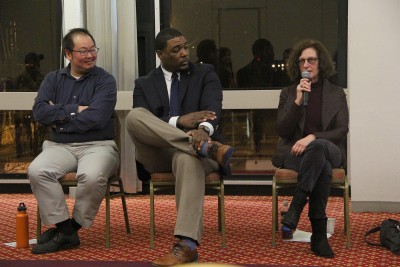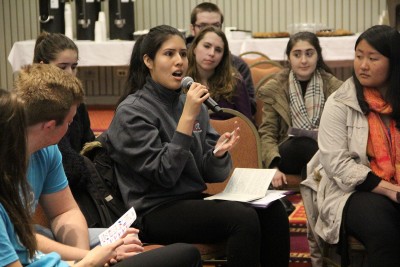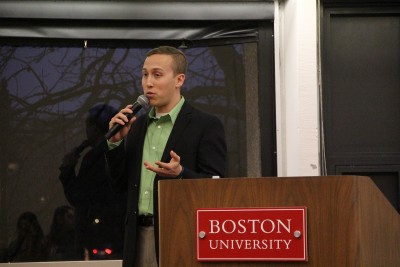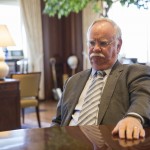
Members of the Boston University community discussed the role of masculinity and efforts to end gender discrimination Tuesday with a panel of three during the “Mind the Gap: Masculinity and the Gender Divide” interactive talk.
Ethan Sobel, director of Student Life at the BU Florence and Chafetz Hillel House, moderated the discussion for a crowd of approximately 25 students and faculty members in Metcalf Hall. The panel, hosted by the BU Student Activities Office, is part of the Gender Advocacy and Progress Week initiated by Student Government.
The performance of masculinity has become an accepted part of society and is rarely questioned, Barbara Gottfried, a panelist and co-director of undergraduate studies in the Women’s, Gender and Sexuality Studies Program, said during the discussion.
“In effect, it’s so naturalized for cisgender men not to think about masculinity,” Gottfried, a professor in the College of Arts and Sciences, said. “We think, ‘Well, that’s just the way it is’ or, ‘Boys will be boys’ or that kind of thing, but that’s not actually the case. It’s actually layers and layers of ingrained learning that we’ve lost track of so that we think of it as natural.”
In response to a question that asked how hegemonic masculinity should be defined, Gottfried said the “incredibly complex question” should be answered and analyzed within the scope of the West — in particular, the United States.

“Because violence, because aggression, because power, because privilege is a part of what we consider to be the privilege of masculinity, we do, I think, in the United States live in a rape culture” Gottfried said. “This is a term that was coined by feminists more than 20 years ago … but what that requires is people be cognizant of … the personhood of women.”
Maxwell Ng, another panelist and the steering committee chair of the Massachusetts Transgender Political Coalition, said his experience with masculinity as a transgender man has revolved around observations and performance.
“We socialize men and boys from a young age to adapt these ideas about what it means to be manly,” Ng, a 1999 BU graduate, said during the talk. “As a transgender man, I have kind of made it the study of my life to observe these things and how they apply to cisgender men as well.”
Daymyen Layne, a panelist and assistant director of housing operations at Salem State University, said men in the United States need to fully understand and appreciate their privileges.
“I could never worry about women’s issues, never worry about anything that doesn’t affect me as a man and a person of color here in America,” Layne said. “Not to say that this is wrong, but these are the blinders that we have on.”
Marian Eiben, one of the GAP Week coordinators and a sophomore in the Questrom School of Business, said the goal of the panel was to educate attendees about how they can look past their privilege and try to help those who suffer from inequality.
“We’re trying to diminish the gaps that are left by gender inequality,” Eiben said after the panel. “It’s the inequality that we feel on a daily basis in many different forms [that makes us] try to fill that [gap] with all of these events.”
Several attendees said they found the discussion informative on various gender issues.

Stacy Ulrich, the director of CAS Student Programs and Leadership, said she was impressed by how students were able to handle debating about issues like masculinity and power in such a public forum.
“I was also really impressed that there were moments when students disagreed with each other publicly,” Ulrich said. “Students were able to do so in a really respectful and effective manner but not shy away from some tough topics where there were disagreements, which is great that they were able to do that.”
Cindy Lee, a senior in the School of Hospitality Administration, said she came to the talk without knowing much about the subject matter, and having an open mind helped her learn.
“Personally, I really don’t know much about feminism or gender equality, so I just really came in without knowing much and just wanted to learn,” Lee said.
Victoria Cunha, a freshman in CAS, said the panel taught her more about how society inflicts different expectations upon men and women.
“Gender inequality is something that plagues both sexes in different ways, but both are very marginalized in their own specific ways,” Cunha said. “Women and men are confined to their categories any time they try to exit their categories by doing something else other than what they are taught. People get very defensive and uncomfortable.”














